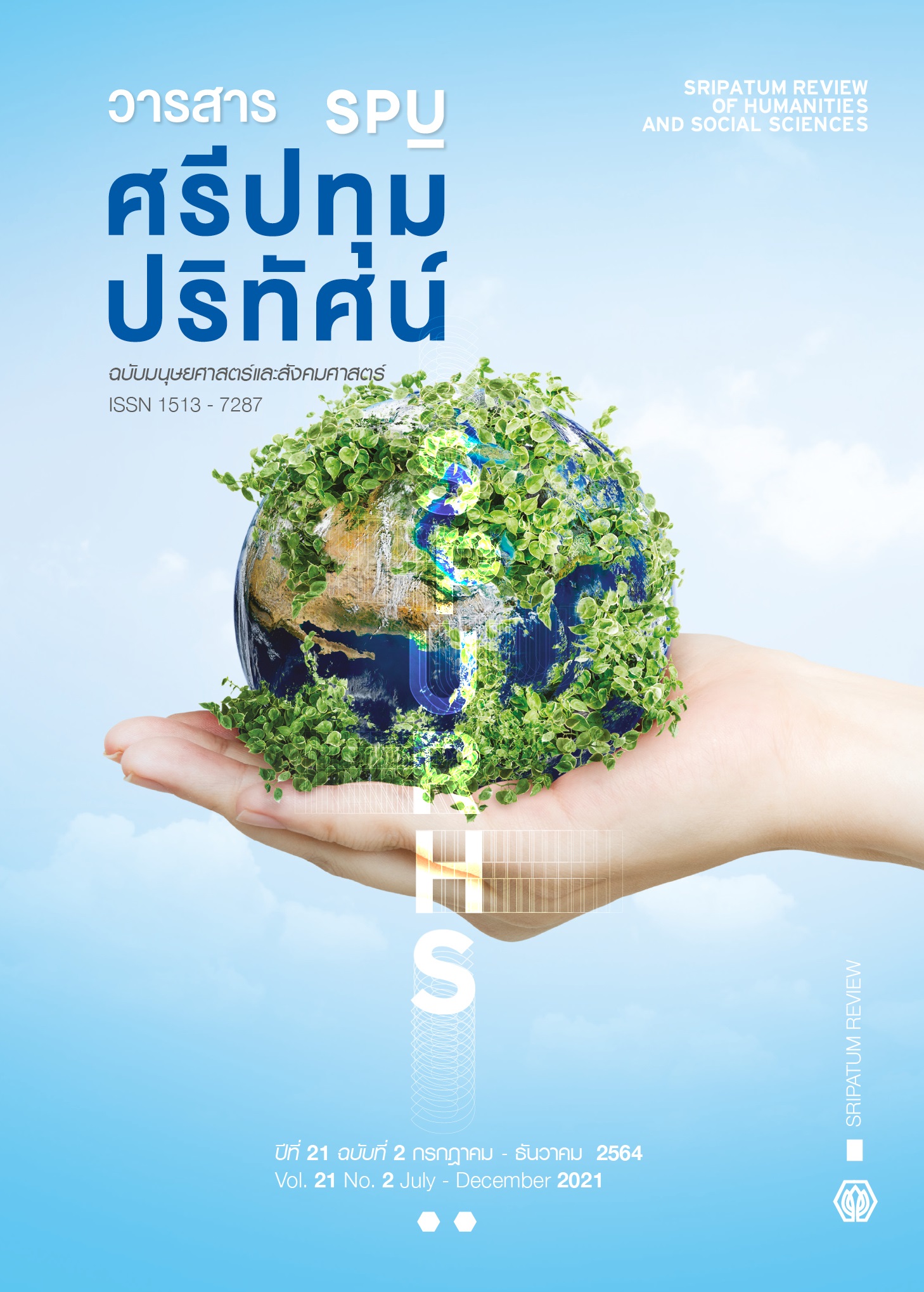A Study of 2017 Secondary Data of the Happiness Among Thai Elderly
Main Article Content
Abstract
The purposes of this research were to study the happiness of elderly people, and to study the factors contributing to the happiness of elderly people in Thailand. This study was a quantitative research. It studied the secondary data from Thailand’s National Statistical Office (NSO) under the research project: “2017 Survey of the Elderly People.” However, this study focused on the self-reported answers of 34,284 elderly people, aged 60 and above, regarding their perceptions on happiness during the past three months. Results indicated that the happiness rating mean of Thai elderly people was 6.98 (Out of the full score of 10.00) with standard deviation of 1.38. When the happiness rating scores were categorized into three groups, it was found that the largest group (49.36%) had moderate level of happiness, followed by the group with high level of happiness (36.17%); while the smallest group (14.47%) had low level of happiness. Furthermore, by using the methods of t-test and F-test to compare happiness mean scores, the test of significance revealed that there were a lot of factors statistically contributing to the happiness of elderly people. Those statistically significant factors were gender, age, education level, marital status, number of children, condition of employment, source of income, participation in important events, objective wellbeing, subjective wellbeing, the access to healthcare through welfare state, household size, and residential area and region. Nonetheless, according to the data, the factors regarding the availability of one’s own children, the older parents staying together with their children, and the being members of clubs/groups were not statistically significant factors contributing to the happiness among elderly people.
Article Details
1. กองบรรณาธิการสงวนสิทธิ์ในการพิจารณาและตัดสินการตีพิมพ์บทความในวารสาร
2. บทความทุกเรื่องจะได้รับการตรวจสอบทางวิชาการโดยผู้ทรงคุณวุฒิ แต่ข้อความและเนื้อหาในบทความที่ตีพิมพ์เป็นความรับผิดชอบของผู้เขียนแต่เพียงผู้เดียว มิใช่ความคิดเห็นและความรับผิดชอบของมหาวิทยาลัยศรีปทุม
3. การคัดลอกอ้างอิงต้องดำเนินการตามการปฏิบัติในหมู่นักวิชาการโดยทั่วไป และสอดคล้องกับกฎหมายที่เกี่ยวข้อง
References
Bowling, A. (1993). The concepts of successful and positive aging. Family Practice, 10(4), 449-453.
Bülow, M. and Söderqvist, T. (2014). Successful ageing: A historical overview and critical analysis of a successful concept. Journal of Aging Studies, 31, 139-49. https://www.sciencedirect.com/science/article/abs/pii/S0890406514000516?via%3ub
Chumnanmak, R., Ayuwat, D. and Narongchai, W. (2018). The composition of happiness of the social change in the globalization. Humanities and Social Sciences, 35 (2), 90-116.
Chyi, H. and Mao, S. (2012). The Determinants of Happiness of China’s Elderly Population. Journal of Happiness Studies, 13(1), 167-185.
Gray, R., Thongthai, V. and Suwannopphakao, R. (2010). Happiness is Universal. Bangkok: Charan Sanitwong Publishing House. (in Thai)
Jaul, E. and Barron, J. (2017). Age-Related Diseases and Clinical and Public Health Implications for the 85 Years Old and Over Population. Frontiers in Public Health, 5(335), 1-7. https://doi.org/10.3389/fpubh.2017.00335
Miret M., et al. (2014). Health and happiness: cross-sectional household surveys in Finland, Poland, and Spain. Bull World Health Organ, 2014(92), 716-725.
National Older Persons Committee. (2010). Nation Plan of Older Persons. Bangkok: The Department of Older Persons, The Ministry of Social Development and Human Security. (in Thai)
National Statistic Office. (2012). The Labor Force Survey Whole Kingdom (Quarter 3). Bangkok: National Statistic Office. (in Thai)
National Statistic Office. (2018). Report on the 2017 Survey of the Older Persons in Thailand. Bangkok: Statistical Forecasting Division National Statistical Office. (in Thai)
National Statistic Office. (2020). The 2018 Happiness Survey in Labor Force Population. Bangkok: National Statistic Office. (in Thai)
National Statistic Office. (2020). Report of the 2019 Household Socio-Economic Survey.Bangkok: National Statistic Office. (in Thai)
Pongatichat, P. (2007). Why isn’t happiness increasing … despite having so much money?. In Promoting the Quality of Life and Work: New Stream of Human Resource Management, P.71-78. Bangkok: Air Born Print. (in Thai)
Rath, T and Harter, J. (2016). Wellbeing: The Five Essential Elements. New York: Gallup Press.
Royal Society of Thailand. (2009). Royal Institute Dictionary (2011 A.D.). Bangkok: Office of the Royal Society. (in Thai)
Siripanich, B. (2010). Comprehensive Guide for Older Persons. 24th Ed. Bangkok: Moh-Chao-Baan Publishing House. (in Thai).
Somphong, S. and Rotjanalert, N. (2014). Happiness of the Elderlies in Nursing Homes, Nakhon Pathom Province. Journal of The Police Nurse, 6 (1), 204-218. (in Thai)
Suriyanrattakorn, S. (2019). Happiness among the Disabled Elderly: A Study based on Micro Data in Udonthani Thailand. Thailand and The World Economy, 37 (1), 83-91.
The Ministry of Public Health. (2018). 2018 Public Health Dictionary (100 Years Thai Public Health). Nonthaburi: Health Technical Office. (in Thai)
World Health Organization. (2002). Active Aging: A Policy Framework. Geneva, Switzerland: World Health Organization (WHO).


